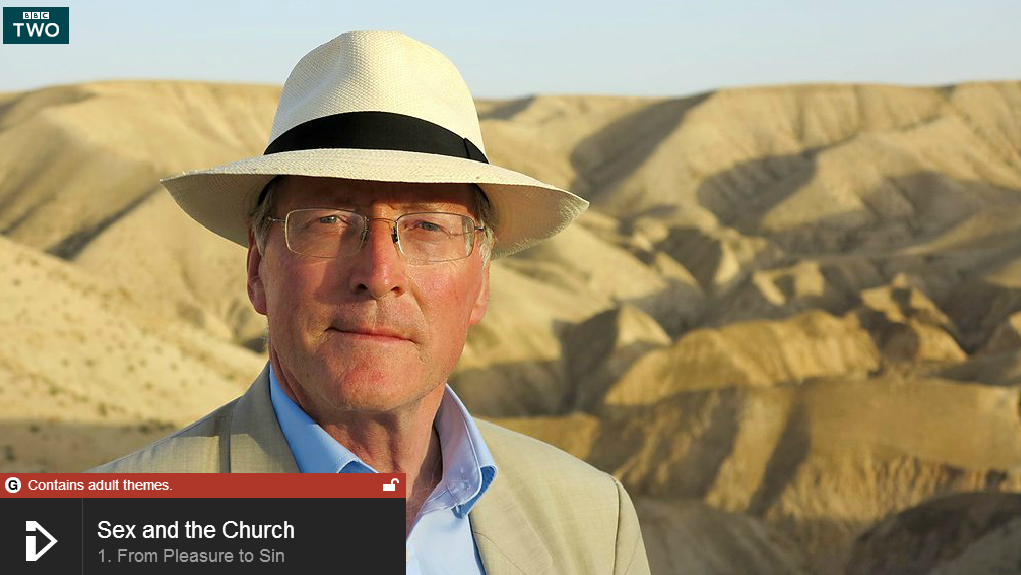Sex and the Church – and Diarmaid MacCulloch
“I think religion has got everything appallingly wrong and it has been terrible for us in sexual terms” declared Diarmaid MacCulloch in an interview about his three-part BBC series, “Sex and the Church.” The series is an attempt to prove his thesis by examining the history of Christian beliefs and practices about sexuality, which he calls “nearly 2,000 years of Christian negativity about sex.”[1] He himself comes from a modern liberal perspective, and is convinced that Christianity has “turned sex from a biological necessity into a vice, from a pleasure into a sin.”[2]

I don’t think MacCulloch would deny that the series is not so much a documentary as a polemic directed against the traditional Christian view on sexuality. And, like every polemic, it is selective, generalising, and chooses an emotionally loaded word where a more neutral word would have served. MacCulloch makes his case in three ways: by showing (1) where Christian beliefs came from, (2) what kept Christian beliefs in place for so long, and (3) the unnoticed contradictions in the Bible on the subject of sexuality.
Where beliefs came from
In order to show where the traditional view of sexuality came from, MacCulloch provides many “genealogies of ideas.” He takes a historical fact (e.g., that Jews were often invaded and conquered) and then links it to a historical belief (the Jews gave importance to procreation) by saying that one caused the other (the Jews needed to multiply after their numbers were depleted). This literary style, of correlating a situation with a resulting belief, makes the program both interesting and persuasive. He does not simply recite historical details: rather, he weaves them into a story about why things happened the way they did, and how we have got to where we are today.
Such genealogies are usually difficult to prove, and MacCulloch doesn’t try to prove them in this program. He simply states them as if they were facts alongside the historical details he gives, giving the impression that they, like the other facts, are undisputed. But sometimes his connections leave a few questions unanswered. For example, he believes that Aristotle’s teaching on male sperm was the determining influence on Christian beliefs about contraception.[3] Taken separately, neither of the historical facts can be denied, but the link between them is less obvious, given that Aristotle and other Greeks believed many other things about sexuality which Christians did not echo. Why were those beliefs not equally determinative?
What keeps beliefs in place
“In its first thousand years, Christianity transformed sex from a subject Jesus hardly discussed, into a sin. The Church taught that celibacy was the Christian ideal. Sex was shameful, and women were sexual temptresses, driven by uncontrollable desire.”[4]
For MacCulloch, people’s beliefs about sexuality can come from two sources: common sense, or the oppressive and controlling power structures of the church. Given this grid, it becomes clear that modern liberal sexual views are the result of the church authorities having “lost control of sex,” giving common sense a chance to shine through.[5]
For example, he describes one 5th century Catholic theologian’s denial of the perpetual virginity of Mary as an “outbreak of common sense” which was slapped down by the leading authorities of the church.[6] It doesn’t matter to him that there are hundreds of millions of Catholics today who believe in the perpetual virginity of Mary, some of whom are tenured professors with as much academic standing and historical knowledge as himself. That can easily be explained by saying they are still under the control of the Catholic church, and unable to think independently.
The message of the Bible
For MacCulloch, it is quite easy to show how unfounded the traditional Christian view is, by paying attention to the Bible.
According to him, Leviticus 18:22 was used throughout church history as a “game, set and match” argument prohibiting homosexual practice.[7] But then, he says, if we read on, we also find prohibitions against “trimming your beard, getting a tattoo, and mixing fabrics in clothing.” He gives no further comment, and it seems obvious that any Christian appeal to Leviticus is inconsistent and can’t be taken seriously. The ease and simplicity of this argument does lead one to wonder: how did nobody ever notice this before? Has everyone in history been either very foolish or very corrupt, to have ignored such an obvious point? Or might there have been more sophisticated ways Christians drew moral meaning from the Old Testament?
MacCulloch claims that Jesus hardly talked about sex at all, only insisting on monogamy and prohibiting divorce. In fact, he says, “Jesus is not at all representative of what was destined to become a sexually repressive religion.”[8] Here Jesus’ austere teaching on lust in the Sermon on the Mount seems to have been forgotten, as have his words about eunuchs of the Kingdom of Heaven. But MacCulloch is keen to show that Jesus is not to blame for the subsequent repressions that the Church imposed upon Christianity.
The first corrupting influence, for MacCulloch, is the apostle Paul. He says that Paul’s teaching took off in a different direction to Jesus, due to his influence from austere Greek thinkers like Plato and Aristotle.[9] Romans 1 seems pretty clearly to view homosexual practice as sin, although MacCulloch points out that this is only “40 words out of nearly 200,000” in the New Testament.[10] He makes no comment on what its smallness means, but seems to think it significant nonetheless. Still, this means that Paul’s teaching diverged from Jesus, who instead was “very hot on forgiveness and mercy.”
Conclusion
“Christianity had long held the view that all sex was a sin.”[11]
Every worldview’s tenets look absurd from the perspective of another worldview, and no institution older than five years can boast a clean record if held up to careful scrutiny. If we combine the genealogies of where Christian beliefs originated, the oppressive church authorities forcing adherence to those beliefs, and the muddled and contradictory passages in the Bible, a clear message emerges from MacCulloch’s series. The traditional Christian teaching about sex both doesn’t make sense and brings massive harm to everyone. We need to be liberated from its influence.
There is no doubt that Christians have often failed to live up to their own standards. I doubt Christian history is alone in this feature. But it is another question whether those standards, rightly understood within their own context, are good or bad. MacCulloch presents Christianity from the ground of firm conviction that the modern liberal view is the right one, the one that does justice to the true shape of human needs, desires and dangers. He holds the Christian story against the plumb line of liberal values and finds it wanting, both in doctrine and in practice.
But I don’t think he has done much to further fruitful discussion between the two views. Why? Partly because his perspective assumes that there is no genealogy to his ideas, that he and other liberals are independent thinkers, free from the influence of social or cultural pressure to think of behave a certain way. In short, he is blind to the plausibility structures that make his own views appear as common sense to many in the 21st century. Genealogies of ideas are fun when they explain other people’s beliefs, but how much do we like it when people use them on us? Additionally, he has not engaged with more careful and thoughtful scholarship on the Bible, which understands all the apparent contradictions he observes and yet still sees it as presenting a unified and coherent message without any conflict between the Old Testament, Jesus, and Paul.
This series reminds us of much in historic Christian practice that we in the church have cause to repent of. That it is a very one sided story is no excuse for what it does reveal, although it might have helped if MacCulloch had provided some positive stories alongside the unrelenting list of negative ones. Consider, for example, chapter five of Rodney Stark’s book, The Rise of Christianity, which attributes Christian success in the ancient world in part to its teaching about, and treatment of, women, which was far superior to anything else known to its time. MacCulloch doesn’t mention this once, even to refute it.
As a criticism of the traditional Christian teaching on sexuality, the series is less compelling. We are shown some of the worst arguments and silliest extremes of some Christian thinkers, but there is less exposure to the more sober and reasoned thinking of some of the church’s best theologians on the same topics, as well as their criticisms of the liberal perspective which MacCulloch endorses. In any future productions I would very much like to hear him engaging with some of those arguments.
[1] Episode 3, near the end
[2] Episode 1, two minutes in
[3] Episode 1, about 17 minutes in
[4] Episode 2, two minutes in
[5] Episode 3, two minutes in
[6] Episode 1, about 45 minutes in
[7] Episode 1, about 12 minutes in
[8] Episode 1, about 20 minutes in
[9] Episode 1, about 21 minutes in
[10] Episode 1, about 26 minutes in
[11] Episode 3, about 3 minutes in
Barney
Latest posts by Barney (see all)
- The Nicene Creed: “One Church” - July 14, 2016
- The Nicene Creed: “…for us and for our salvation…” - June 24, 2016
- Pacifism and Politics: The Tank and the Letter - May 3, 2016

